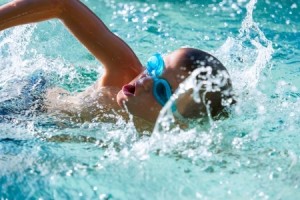Every parent wants to see his or her child succeed, and it can be challenging to watch other kids progress through stages of swim programs while your child struggles with a particular skill. It’s essential to realize that every child learns at his or her own pace and picks up different skills at various rates. The only thing that’s important is that your child is learning each skill fully and can to put it into practice when needed.
Parents often ask the question, “Why isn’t my child progressing in swim lessons?” Of course, the answer isn’t a simple one because there are many potential reasons. Here are some things to keep in mind.
Trust in the Process
The Premier Team has developed a process that is proven to work for teaching children how to swim. We don’t believe in the sink-or-swim mentality of old; instead, we believe in progressively teaching children essential swim skills and nurturing a love of the water.
Especially as children hit two years old and older, they naturally develop uncertainty of new experiences. Therefore, our swim lesson process begins with establishing a bond between the student and the instructor. It is essential for parents to support this process by encouraging their children to trust the instructor and by trusting the instructor themselves. Parents who can’t resist the urge to step-in or interfere with the lesson are negatively impacting their child’s likelihood of progressing smoothly.
Developmental Stages
At each stage of development, children are generally capable of learning different skills. As any pediatrician will tell you, the ages in which children are “supposed” to hit those developmental stages are purely averages. Parents should not obsess about the age at which their child should be able to achieve something. Instead, parents should focus on their child’s overall progression of skills – physical, intellectual, and emotional.
Past Experiences
A child’s past experiences can play a major role on the speed at which he or she learns a new skill. From children who developed a fear of the water due to an earlier traumatic experience to those who have a distrust of strangers, overcoming fears and insecurities can often take priority over learning the actual skill at hand. Children with more of these challenges to overcome may progress a little slower, but with gentle and steady guidance, they will be swimming with the other kids in no time.
Outside Practice
As with everything in life, practice makes perfect. If your child seems to be falling behind in swim lessons and you’re wondering what you can do to help, get in the water with them during the days they don’t have swim lessons. Talk with your child’s swim instructor about games you can play together that will reinforce the skills they are learning in class. And remember – have fun with your kids when you’re in the water together in order to continue nurturing their love of the water.
Premier Aquatic Services swim instructors use an exciting approach to help swimmers of all ages learn the skills necessary for a lifetime of swimming enjoyment. Our certified swim instructors are experienced with teaching all levels, and they are able to help parents differentiate between a child’s normal progression and signs of developmental issues that should be watched.
To learn more about our swim lesson programs and register family for winter and spring classes, visit our aquatic services page.
For more information on water safety, follow us on Facebook.
